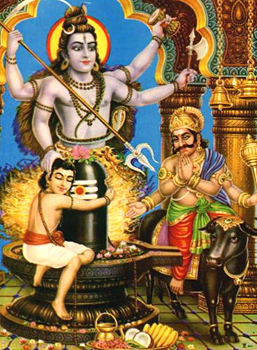Rescued by Nilakanta-Shiva: Mrikandu was a great rishi. Marudvati was his wife. For a long time they had no children.
The rishi prayed to lord Siva. Lord Siva appeared to him, and said,
"I am pleased with you, Mrikandu. Tell me, do you want a hundred sons,
who will live for a long time, but will all be foolish?
Or, do you want one very intelligent son, who will live for only sixteen years?"
The rishi at once said, "Lord, give me that one intelligent son."
Lord Siva said, "Good! You shall have him."
Soon the rishi got a son. He named him Markandeya. The
boy grew to be very intelligent and handsome. The rishi invested him
with the sacred thread. Markandeya learnt the Vedas and Sastras,
easily. Everyone liked him.
As the boy was getting on to be sixteen, Rishi Mrikandu
became sadder and sadder. One day Markandeya asked his father:
"Father, why do you look so sad?"
The rishi said, "Son! What shall I say? When Lord Siva
gave you to me, he said you would live only sixteen years. You are now
about to reach that age. How can Iand your mother bear to lose you as
we will at the end of this year?"
Markandeya said, "Father! Is that the reason? Lord Siva
is very kind to His devo- tees. You yourself told me that. He has
saved many from death before. I have read about it in the Puranas. I
shall therefore worship Lord Siva day and night from today. I am sure,
He will save -me too! "
RishiMrikandu was very happy to hear his son say this. He blessed his son.
Markandeya built a Siva-Linga at a spot on the
sea-shore. He started worshipping Lord Siva morning, noon and night. He
sang bhajans, and often danced in joy.
On the last day, Markandeya was about to sing bhajans,
when Yama, the Lord of Death, came to him. Yama rode on a buffalo. He
held a noose in his hand. He spoke to Markandeya, "Stop your bhajan! You
boy! Your life in this world is over. Be ready to die."
Markandeya was not afraid. He clung to the Siva-Linga as one clings to one's mother.
Yama threw his noose round the boy's neck, and pulled him along with the Siva- Linga.
Then the Siva-Linga burst open and Lord Siva came out
of it, Lord kicked Yama in the chest, and said, "Yama, begone! Don't
touch this boy. He is my beloved devotee. He will live forever!"
Yama went away crest-fallen. Markandeya then prayed to
Lord Siva more fervently than ever. This prayer says at the end of each
line, "What can Death do to me?" Many people recite this prayer even
now.
Markandeya came home, and fell at the feet of his
parents. They embraced him, and wept with joy. Markandeya became a great
rishi, and lived very long.
Meaning of the story: The
story as narrated above comes to us from the Skanda Purana. There are
other versions of the story that differ in details, but our concern here
is to understand what we are being told in this beautiful tale. What
does it mean for Markandeya to be saved by Shiva and for Shiva to
destroy Kala?
For Markandeya to be
saved by Shiva means that Shiva's Anugraha Shakti had descended upon the
boy-sage. Markandeya had at a young age attained enlightenment and
become a jivan-mukta. He was no more bound by time (kala) or death. He
had broken through the cycle of birth and death. Verily, Markandeya had
gained oneness with Lord Mrityunjaya and conquered death itself.
For
Shiva to destroy Yama and become angry that Yama should have the
audacity to encircle the Lingam indicates that Shiva is beyond death and
time. He is the Eternal Lord. He is the Ruler of time (Mahakaleshvara);
He is the Originator of time (Mahakala) and Destroyer of time (Kalari
or Kalasamhara Murti). Time in the story is represented by Yama since
time brings death and dissolution to all things, but Shiva brings death
to time itself. So, He is called Mahakalakala or Mahakalabhairava. When
all things decay, Shiva alone remains. As He alone is beyond death and time, Shiva is called Maha Mrityunjaya, the great Conquerer of Death. The
moral of the story is that we, like the boy-sage Markandeya, should
also pray and meditate on Shiva-Mrityunjaya, for He alone can take us
unto the state beyond the cycles of samsara:

|